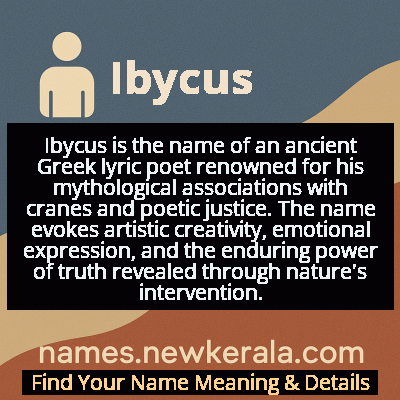Ibycus Name Meaning & Details
Origin, Popularity, Numerology Analysis & Name Meaning of Ibycus
Discover the origin, meaning, and cultural significance of the name IBYCUS. Delve into its historical roots and explore the lasting impact it has had on communities and traditions.
Name
Ibycus
Gender
Male
Origin
Greek
Lucky Number
7
Meaning of the Name - Ibycus
Ibycus is the name of an ancient Greek lyric poet renowned for his mythological associations with cranes and poetic justice. The name evokes artistic creativity, emotional expression, and the enduring power of truth revealed through nature's intervention.
Ibycus - Complete Numerology Analysis
Your Numerology Number
Based on Pythagorean Numerology System
Ruling Planet
Neptune (Ketu)
Positive Nature
Intuitive, analytical, spiritual, and inquisitive.
Negative Traits
Secretive, reserved, aloof, and can be overly critical.
Lucky Colours
Green, yellow.
Lucky Days
Monday.
Lucky Stones
Cat’s eye, moonstone.
Harmony Numbers
1, 5, 6.
Best Suited Professions
Scientists, researchers, spiritual leaders, detectives.
What People Like About You
Depth of knowledge, analytical skills, spirituality.
Famous People Named Ibycus
Ibycus of Rhegium
Ancient Greek Lyric Poet
One of the Nine Lyric Poets of ancient Greece, known for his choral lyrics and love poetry
Ibycus (mythological figure)
Mythical Bard
Subject of the famous 'cranes of Ibycus' legend where cranes revealed his murderers
Ibycus Scholasticus
Byzantine Poet
Christian poet who composed epigrams preserved in the Greek Anthology
Name Variations & International Equivalents
Click on blue names to explore their detailed meanings. Gray names with will be available soon.
Cultural & Historical Significance
The name Ibycus thus carries dual significance: as a marker of artistic achievement in the development of Greek lyric poetry, and as a mythological emblem of divine retribution and the power of nature to reveal truth. This combination made him a favorite subject in later European literature, particularly during the Romantic period when Friedrich Schiller's ballad 'The Cranes of Ibycus' revived interest in his legend. The name continues to represent the intersection of art, justice, and the supernatural in the classical tradition.
Extended Personality Analysis
Those bearing the name Ibycus are often perceived as possessing a deeply artistic and sensitive nature, with strong intuitive abilities and emotional intelligence. They tend to be observant and thoughtful, with a natural inclination toward creative expression—whether through writing, music, or other artistic mediums. The mythological associations suggest individuals who value truth and justice highly, often serving as moral compasses in their social circles. Their personality typically combines introspection with a desire for meaningful connection, reflecting the ancient poet's ability to explore personal emotions while creating works for communal appreciation.
The crane symbolism adds further dimension, indicating someone who may move between different social groups or intellectual pursuits while maintaining core values and loyalties. Ibycus-named individuals often demonstrate perseverance in their creative endeavors and a belief that truth will ultimately prevail. They may exhibit a certain dramatic flair or intensity in their personal expression, mirroring the emotional depth found in ancient Greek lyric poetry. Their combination of artistic sensitivity and moral conviction makes them compelling figures who often leave lasting impressions on those they encounter.
Modern Usage & Popularity
In contemporary naming practices, Ibycus remains an exceptionally rare choice, primarily confined to families with strong classical education or particular interest in Greek history and mythology. The name has never appeared in popular baby name databases or rankings, maintaining its status as a scholarly and distinctive option. Its usage is most common in academic circles, among classicists, or in fictional contexts where ancient Greek themes are prominent. The name's complexity and strong mythological associations make it challenging for everyday use, though it occasionally appears in historical fiction or as a character name in works exploring classical themes. Its continued presence in classical studies ensures that the name remains known within educated circles, even as it avoids mainstream popularity.
Symbolic & Spiritual Meanings
Symbolically, Ibycus represents the transcendent power of art and the inevitable revelation of truth. The crane imagery associated with his legend makes the name a symbol of vigilance, migration between different states of being, and the connection between earthly and divine justice. As a poet's name, it embodies the idea that creative expression can achieve immortality beyond physical existence. The mythological narrative adds powerful connotations of cosmic justice—that wrongdoing cannot remain hidden forever and that nature itself may serve as an instrument of revelation. The name also symbolizes cultural bridge-building, reflecting the historical Ibycus's position between Eastern and Western Greek traditions, and the enduring power of artistic legacy to influence subsequent generations across temporal and geographical boundaries.

